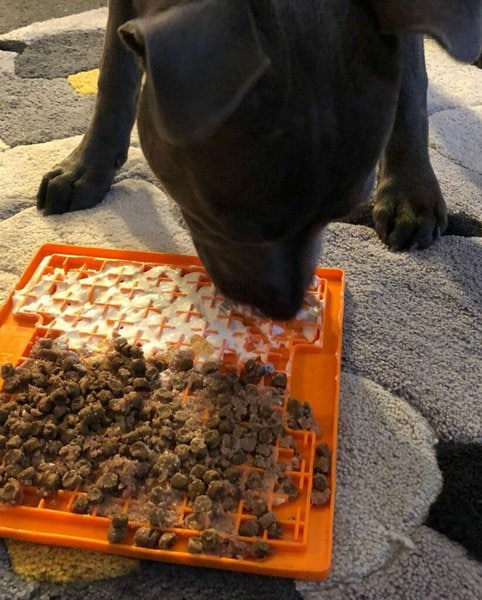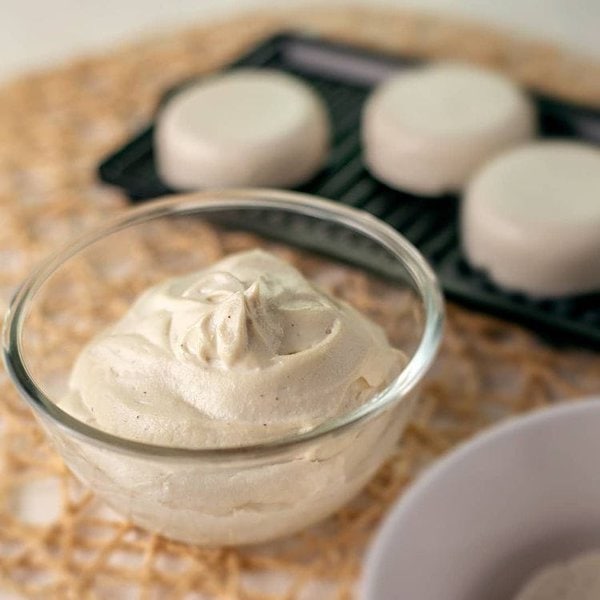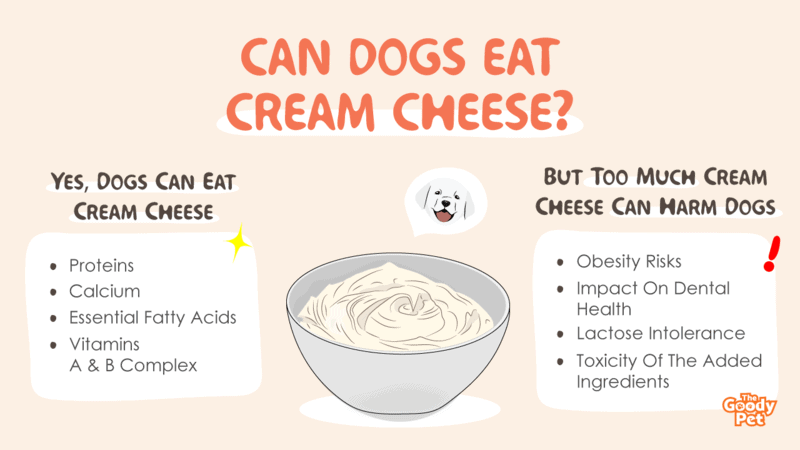Every dog food plays an important role in its overall health. However, it is essential to be mindful of what goes into your dog’s mouth and keep a watchful eye on your dog’s diet and nutrition. You probably might have heard that dairy is not suitable for dogs, but what about cream cheese? I did some research on cream cheese, and here is what I found. So, is cream cheese safe for dogs?
Yes, it is safe for dogs to consume cream cheese but only in moderation. Cream cheese is a decent source of fatty acids, proteins, and vitamins. Although it is neither poisonous nor toxic to dogs, the high sugar and fat content that its consumption brings to the dogs’ health can become a concern.
Technically, cream cheese is safe for dogs, but you should prevent them from eating too much of it. If dogs overconsume cream cheese, they can experience some crazy negative effects like diarrhea or stomachaches.
However, that is not the only thing you should consider, as there are a lot of other ingredients and flavors that could upset your dog’s stomach. This guide will help you know the right portion of cheese and some of the harmful ingredients added to cream cheese to ensure your dog remains safe and in good health. So, keep reading to find out.
Is Cream Cheese Good For Dogs?

Generally, cream cheese, including regular cheese, is good for dogs but in small amounts. According to the American Kennel Club, cream cheese can be beneficial for dogs as it has essential fatty acids, calcium, vitamin A and B-complex, as well as proteins.
However, whether or not your dog can consume cream cheese will depend on the type or flavor of cream cheese. Some cream cheese may have extras that may be harmful to dogs. Feeding your dog a very tiny amount of plain cream cheese is generally acceptable.
What Are The Healthy Ingredients In Cream Cheese?
Although cream cheese is not one of the best treats to give your dog, it boasts some healthy ingredients that you should be aware of. So, here are some of the healthy ingredients in cream cheese;
Proteins
Cream cheese has proteins, but it is only a tiny percentage of it which may not significantly affect your dog. This is because you can only feed the dog in small amounts, and there are better sources of protein that you can give your dog.
Calcium
The two primary ingredients in cream cheese are milk and cheese. Both of these ingredients are excellent sources of calcium. However, cream cheese will have less calcium content in comparison to other types of cheese because of its high water content.
Despite this, the calcium in cream cheese can help promote your dog’s bone and tooth health.
Essential Fatty Acids
Cream cheese contains essential fatty acids that the dog requires for a healthy body system. However, with the high amounts of fats and calories in the formula, it is not recommended to feed it frequently to dogs.
Vitamins
Cream cheese is also a great source of vitamins as it contains high amounts of vitamin A and moderate amounts of vitamin B12. This comes in handy to turn the fat intake into energy and also maintain the dog’s health.
Is Cream Cheese Bad For Dogs?

While cream cheese is not entirely bad for dogs, it is not very beneficial, and it can cause more harm than good. Giving too much to your dog can cause negative effects because it is really high in sugars and fat.
For this reason and many others, cream cheese may not be the best option when it comes to dog foods or treats.
Cream cheese contains added harmful ingredients to enhance the taste. As a result, the taste of cream cheese may be addictive to dogs, and they will keep wanting more. Don’t give in because it will only result in health issues.
What Are The Harmful Ingredients In Cream Cheese?
Although cream cheese is nontoxic and not poisonous, some ingredients may be harmful to your canine friend. If you’re planning to give cream cheese as a treat to your dog, ensure it is free from ingredients such as;
High-Fat Content
A lot of cream cheese brands will have a very high-fat content. This means that frequently feeding the dog with store-bought cream cheese could potentially lead to obesity and other issues related to unhealthy weight gain.
Onions And Garlic
Whether it is store-bought or homemade, you should never feed your dog cream cheese that contains garlic, onions, or chives.
This is because such ingredients, which are under the allium family, contain thiosulfate that may cause damage to the red blood cells and increase the chances of your dog getting hemolytic anemia.
Cayenne Pepper
Some cream cheese comes with additional spices to improve the taste, which is not recommended for dogs. Some of them will have cayenne pepper which is very irritating to dogs and may cause a burning sensation in the tummy, throat, and mouth. Feeding your dog cream cheese that contains cayenne pepper may lead to diarrhea and vomiting, too.
Concerns About Cream Cheese
If your dog hasn’t had cream cheese or any type of cheese before, it is recommended to start with a very small amount and wait to see how the dog will react. Some of the major concerns and issues when it comes to cream cheese include;
Obesity Risks
If your dog is trying to cut down a few pounds, is obese, or overweight, you should avoid cheese treats. The fat will wear only on your dog’s waistline and overall health. High-fat foods such as cream cheese can easily lead to pancreatitis.
Impact On Dental Health
Unlike other types of cheeses, cream cheese is very high in sugar which is not great for the dog’s teeth and health. As a result, this product should only be given to dogs as a treat and not as a replacement for a meal.
Lactose Intolerance
Similar to other dairy products, cream cheese is not recommended for lactose-intolerant dogs. This is because the dog may be unable to digest it properly and may cause some irritation. Any sign of stomach upset, even with a tiny piece of cheese, may mean that your dog is lactose intolerant.
Toxicity Of The Added Ingredients
As mentioned earlier, cheese could have some added toxic ingredients, such as onions, garlic, or other flavors that might be harmful to your dog. Therefore, always check the ingredients list before feeding it to your dog.
Can Dogs Eat Cream Cheese?
Yes, cream cheese has a healthy delight for your dog, including healthy proteins, calcium, vitamins, and essential fatty acids. However, too much of it can lead to health problems.
Hence, always feed your dog foods in moderation. If you feed your dog with a small portion of cream cheese, then you won’t have to worry about your dog’s health.
As a dog owner, it should be a priority to take care of your dog and ensure it doesn’t feed on too much cream cheese. A dog’s body may not be able to produce a lot of lactase to break down cream cheese for digestion. This means that too much of it will only cause digestion problems like diarrhea and stomach upsets.
Can Puppies Eat Cream Cheese?
A puppy’s digestive system is very new and sensitive. As a result, never give your puppies cream cheese or any other type of dairy. Don’t allow them to eat cream cheese unless they are older and are able to handle small amounts of dairy.
Is Philadelphia Cream Cheese OK For Dogs?
Philadelphia is one of the most known brands of cream cheese, and you may sometimes wonder if your dogs can feed on it. Just like any other cream cheese brand, dogs should only eat a small piece of Philadelphia cream cheese.
However, you should never give this cheese to dogs with kidney problems and who are overweight because they have a high calorie, fat, and salt content.
Can Dogs Consume Low-Fat Cream Cheese?
While it’s not advisable for dogs to consume high-fat cream cheese, a low-fat one might not help either. This is because fat is not the only problem with cream cheese, and there are other problems, including high sugars and lactose.
So low-fat cream cheese is only a better choice than full-fat cream, but that doesn’t mean it’s healthy.
Can Dogs Eat Whipped Cream Cheese?
Dogs can safely consume very small amounts of whipped cream cheese as long as there are no added flavors or sugars in the cream cheese. Always read the ingredients because too much sugar can be very harmful to dogs.
Can Dogs Eat Vegan Cream Cheese?
Whether or not a dog can consume vegan cream cheese depends on how it is made. Most vegan cream cheeses are made from pureed cashew nuts. So, if your dog has a nut allergy, then stay away from vegan cream cheese.
Also, some vegan cream cheese may have too much garlic, onions, and salt, which you shouldn’t feed to dogs.
Can Dogs Eat Cream Cheese Spread?
Cream cheese spread can only be safe for dogs when consumed in small amounts. However, you should never give your dog cream cheese spreads made from spicy peppers, added sugars, or garlic.
Can Dogs Have Bagel And Cream Cheese?
Bagels and cream cheese are totally fine for dogs when taken in small portions. You need to ensure that the bagel is plain and doesn’t contain any additional ingredients like raisins, which are harmful to dogs. However, bagels may have lots of carbohydrates and calories, making them not the healthiest choice.
Can Dogs Eat Bread With Cream Cheese?
Bread with cream cheese is another type of food that is safe for dogs when consumed in small quantities. For example, one half of a slice of bread with a bit of plain cream cheese won’t hurt your dog unless they are allergic or lactose intolerant.
Can Dogs Eat Crackers and Cream Cheese?
Generally, crackers and cream cheese in small amounts are safe for dogs. However, different types of crackers have different reactions to dogs.

Can Dogs Eat Flavored Cream Cheese?
Yes, but it depends on the flavor used in the cream cheese. Here are some popular cream cheese flavors and how safe they are for your dog.
Strawberry Cream Cheese
So, can dogs consume strawberry cream cheese? Yes, dogs can consume strawberry cream cheese but in small amounts. Remember to check the ingredients to ensure that the flavored cream cheese is not made of any artificial flavors or sugars. Instead, you can add a few fresh strawberries to unflavored cream cheese for an enhanced taste.
Blueberry Cream Cheese
Just like strawberry-flavored cream cheese, dogs can consume blueberry cream cheese, but in small quantities. However, do not give your dog any blueberry cream cheese with additional sugar and artificial ingredients. Instead, you can add some fresh blueberries to the little piece of cream cheese that you give your dog.
Can Dogs Eat Salmon Cream Cheese?
Yes, dogs can consume salmon cream cheese but in small amounts. However, most varieties of salmon cream cheese have added sugars that might be unsafe for your dog to consume.
Can Dogs Eat Cream Cheese Frosting?
No, it is not recommended to give your dog cream cheese frosting or any other kind of frosting. The frosting has too much sugar and vanilla extract, which is dangerous for dogs.
Can Dogs Eat Cream Cheese Fruit Dip?
Yes, as long as the cream cheese fruit dip doesn’t contain added sugars or artificial ingredients, dogs can safely consume it, but in small quantities.
How Much Cream Cheese Can A Dog Have?
Since cream cheese is not essential for your dog’s health, it should only be fed occasionally in small amounts and as a treat. This is because too much of it can cause obesity, digestive problems, or even pancreatitis.
The maximum amount of cream cheese that a dog can consume at a given time is approximately a spoon full. Going above that could potentially cause some of the problems mentioned above. Be careful not to go overboard, as cream cheese barely has any impressive health benefits to sustain their health.
What Happens When A Dog Eats Cream Cheese?
While most dogs will enjoy the satisfying and rich flavor of cream cheese, there are some dangers that may result from a dog consuming cream cheese. A little bit of cream cheese may not hurt; however, some dogs are cheese intolerant and may have a hard time digesting it.
When dogs consume too much cream cheese, they are likely to experience symptoms like diarrhea, vomiting, and frequent flatulence.
In addition, be mindful of cream cheese and other dairy products as they can be high in calories, increasing the chances of obesity or pancreatitis.
What Do I Do When My Dog Eats Cream Cheese?
If your dog consumes cream cheese, you need to watch them closely. If the dog starts showing signs of stomach upsets, discontinue feeding cream cheese to your dog, and seek professional help. Sometimes your dog may be allergic or lactose intolerant, and you don’t know yet.
How To Safely Feed Cream Cheese To Dogs
Feeding your dog in small amounts is not enough; there are other things you need to consider. First, you need to ensure that the cream cheese doesn’t have any additional ingredients that may be toxic to dogs. Additionally, the cheese needs to be fresh and not moldy.
You can either give your dog plain cream cheese in tiny amounts or use it as an ingredient in making other meals.
Cream cheese also comes in handy for hiding medicine, especially for stubborn dogs. However, you should be careful when doing this because your dog might refuse to take medicine without cream cheese added to it.
Cream cheese can also be given to dogs as a high-reward treat by cutting it into tiny pieces. If your dog is bored, you can add a piece of cheese to their toy to keep them occupied, especially when you’re leaving them home alone.
What Are The Best Alternatives For Cream Cheese?
There are a lot of foods that can be used as alternatives for cream cheese. Cottage cheese is an excellent pick if you’re looking for an alternative type of cheese to substitute for cream cheese.
Unlike cream cheese, cottage cheese is high in calcium and protein, making it a bit healthier to feed your dogs. Alternatively, you can also consider giving your dog other types of meals that may act as tasteful treats. For example;
- Carrots – They are good for chewing and come in handy to improve the dog’s dental health.
- Peanut butter – It features healthy fats and vitamins to ensure your dog stays full and active throughout the day.
- Apples – They have dietary fiber and help refresh the dog’s breath.
- Celery – An excellent source of fiber and is low in fat.
- Blueberries – These are low-calorie treats that help boost the dog’s immune system.
- Bananas – They are rich in potassium and help cure a dog’s upset stomach.





